HSYP 808: Nutrition, Mental Health and Young Adults: A Report
VerifiedAdded on 2022/12/23
|12
|2810
|4
Report
AI Summary
This report investigates the relationship between poor nutrition and altered mental states in young adults, synthesizing findings from multiple research papers. It explores how nutrient deficiencies, including those of carbohydrates, proteins, vitamins, and minerals, can negatively impact mental health, potentially leading to conditions like depression, schizophrenia, and cognitive impairments. The report also examines strategies to address malnutrition, such as educational campaigns and policy changes. The conclusion emphasizes the importance of a balanced diet for maintaining mental well-being and highlights the adverse effects of poor nutrition on brain function and overall health. This analysis is based on a comprehensive review of available literature and aims to provide a coherent picture of the topic, identifying research gaps and offering conclusions regarding the study question.
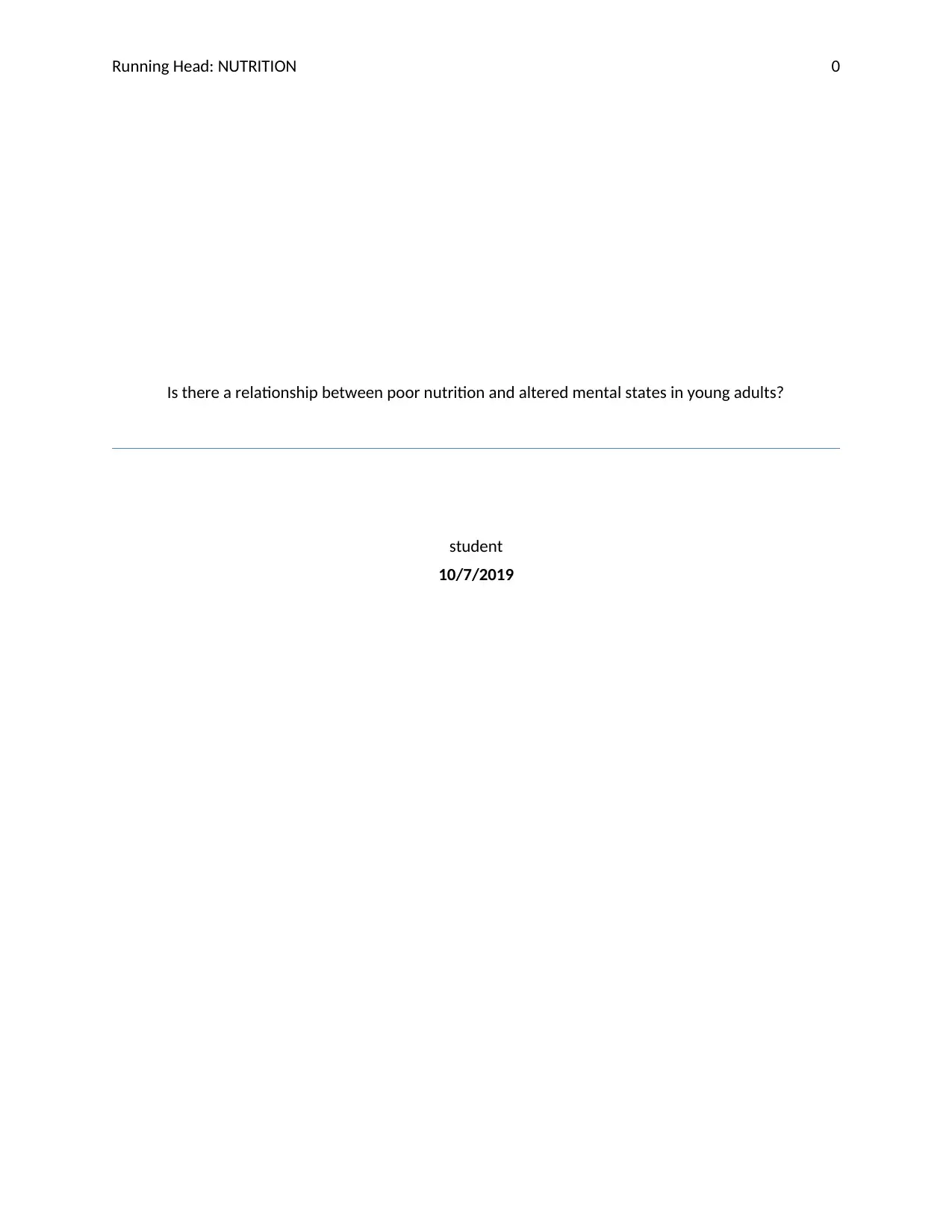
Running Head: NUTRITION 0
Is there a relationship between poor nutrition and altered mental states in young adults?
student
10/7/2019
Is there a relationship between poor nutrition and altered mental states in young adults?
student
10/7/2019
Paraphrase This Document
Need a fresh take? Get an instant paraphrase of this document with our AI Paraphraser

NUTRITION
1
Table of Contents
Introduction.................................................................................................................................................2
Poor nutrition and altered mental health....................................................................................................3
Deficiency of Nutrients............................................................................................................................4
Strategies to overcome issues.................................................................................................................6
Conclusion...................................................................................................................................................7
References...................................................................................................................................................8
1
Table of Contents
Introduction.................................................................................................................................................2
Poor nutrition and altered mental health....................................................................................................3
Deficiency of Nutrients............................................................................................................................4
Strategies to overcome issues.................................................................................................................6
Conclusion...................................................................................................................................................7
References...................................................................................................................................................8
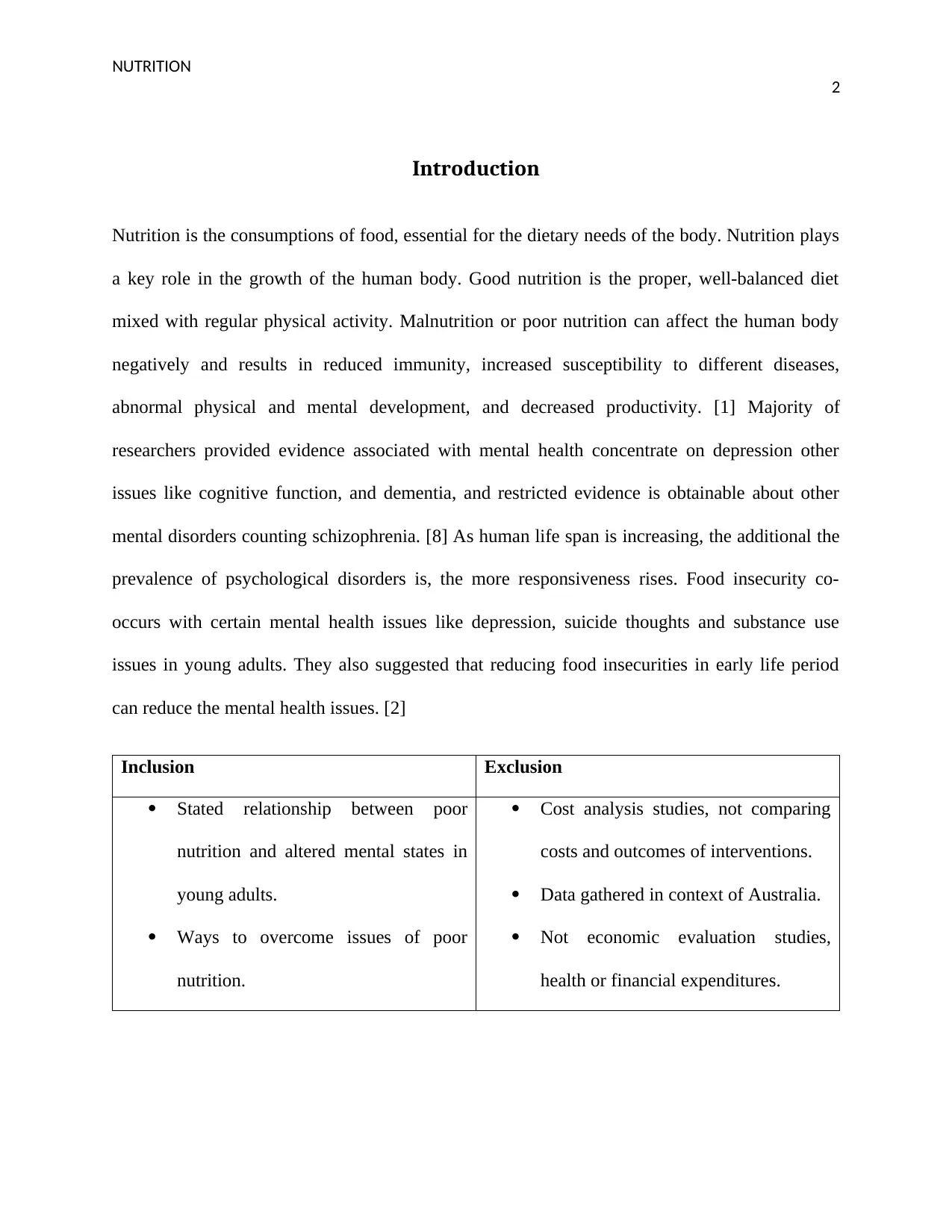
NUTRITION
2
Introduction
Nutrition is the consumptions of food, essential for the dietary needs of the body. Nutrition plays
a key role in the growth of the human body. Good nutrition is the proper, well-balanced diet
mixed with regular physical activity. Malnutrition or poor nutrition can affect the human body
negatively and results in reduced immunity, increased susceptibility to different diseases,
abnormal physical and mental development, and decreased productivity. [1] Majority of
researchers provided evidence associated with mental health concentrate on depression other
issues like cognitive function, and dementia, and restricted evidence is obtainable about other
mental disorders counting schizophrenia. [8] As human life span is increasing, the additional the
prevalence of psychological disorders is, the more responsiveness rises. Food insecurity co-
occurs with certain mental health issues like depression, suicide thoughts and substance use
issues in young adults. They also suggested that reducing food insecurities in early life period
can reduce the mental health issues. [2]
Inclusion Exclusion
Stated relationship between poor
nutrition and altered mental states in
young adults.
Ways to overcome issues of poor
nutrition.
Cost analysis studies, not comparing
costs and outcomes of interventions.
Data gathered in context of Australia.
Not economic evaluation studies,
health or financial expenditures.
2
Introduction
Nutrition is the consumptions of food, essential for the dietary needs of the body. Nutrition plays
a key role in the growth of the human body. Good nutrition is the proper, well-balanced diet
mixed with regular physical activity. Malnutrition or poor nutrition can affect the human body
negatively and results in reduced immunity, increased susceptibility to different diseases,
abnormal physical and mental development, and decreased productivity. [1] Majority of
researchers provided evidence associated with mental health concentrate on depression other
issues like cognitive function, and dementia, and restricted evidence is obtainable about other
mental disorders counting schizophrenia. [8] As human life span is increasing, the additional the
prevalence of psychological disorders is, the more responsiveness rises. Food insecurity co-
occurs with certain mental health issues like depression, suicide thoughts and substance use
issues in young adults. They also suggested that reducing food insecurities in early life period
can reduce the mental health issues. [2]
Inclusion Exclusion
Stated relationship between poor
nutrition and altered mental states in
young adults.
Ways to overcome issues of poor
nutrition.
Cost analysis studies, not comparing
costs and outcomes of interventions.
Data gathered in context of Australia.
Not economic evaluation studies,
health or financial expenditures.
⊘ This is a preview!⊘
Do you want full access?
Subscribe today to unlock all pages.

Trusted by 1+ million students worldwide
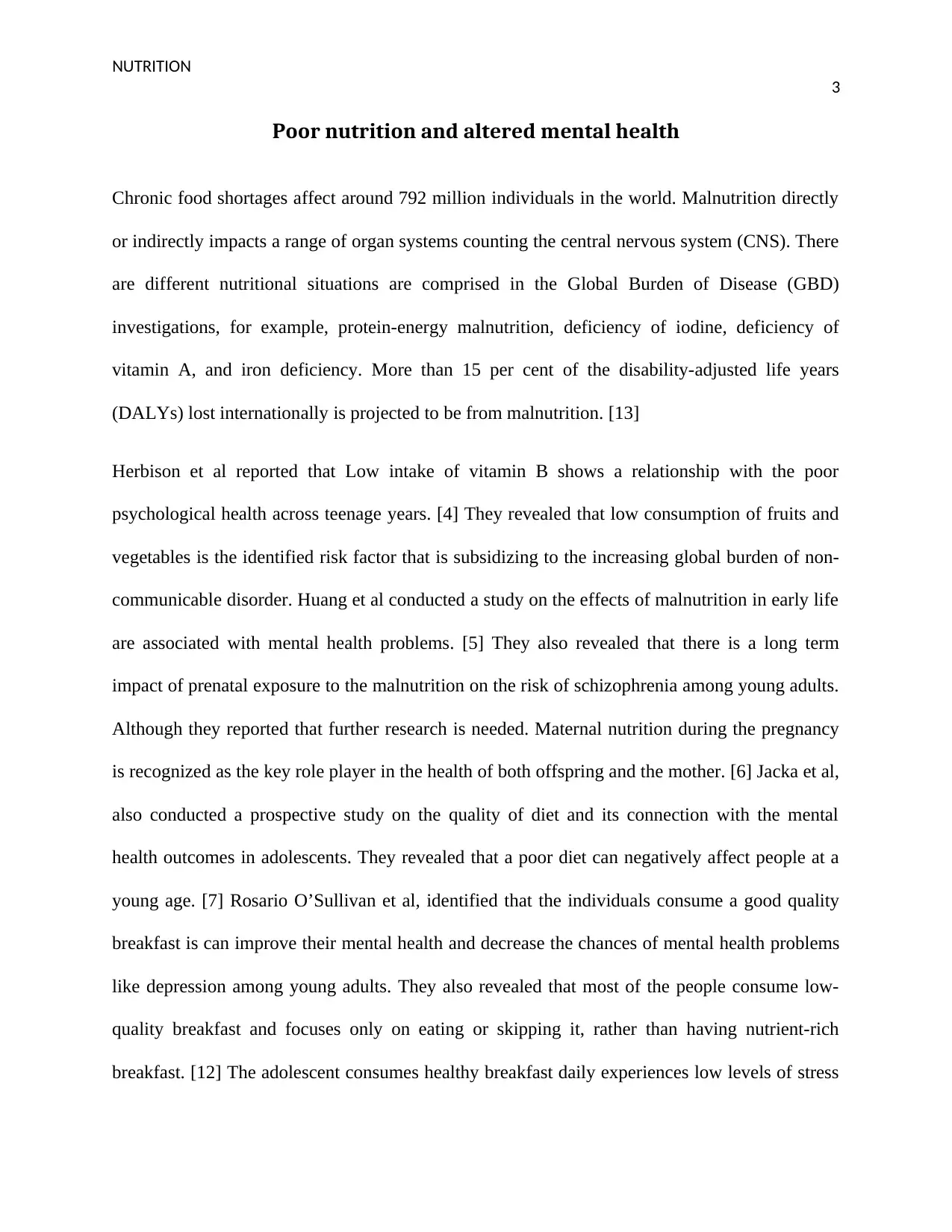
NUTRITION
3
Poor nutrition and altered mental health
Chronic food shortages affect around 792 million individuals in the world. Malnutrition directly
or indirectly impacts a range of organ systems counting the central nervous system (CNS). There
are different nutritional situations are comprised in the Global Burden of Disease (GBD)
investigations, for example, protein-energy malnutrition, deficiency of iodine, deficiency of
vitamin A, and iron deficiency. More than 15 per cent of the disability-adjusted life years
(DALYs) lost internationally is projected to be from malnutrition. [13]
Herbison et al reported that Low intake of vitamin B shows a relationship with the poor
psychological health across teenage years. [4] They revealed that low consumption of fruits and
vegetables is the identified risk factor that is subsidizing to the increasing global burden of non-
communicable disorder. Huang et al conducted a study on the effects of malnutrition in early life
are associated with mental health problems. [5] They also revealed that there is a long term
impact of prenatal exposure to the malnutrition on the risk of schizophrenia among young adults.
Although they reported that further research is needed. Maternal nutrition during the pregnancy
is recognized as the key role player in the health of both offspring and the mother. [6] Jacka et al,
also conducted a prospective study on the quality of diet and its connection with the mental
health outcomes in adolescents. They revealed that a poor diet can negatively affect people at a
young age. [7] Rosario O’Sullivan et al, identified that the individuals consume a good quality
breakfast is can improve their mental health and decrease the chances of mental health problems
like depression among young adults. They also revealed that most of the people consume low-
quality breakfast and focuses only on eating or skipping it, rather than having nutrient-rich
breakfast. [12] The adolescent consumes healthy breakfast daily experiences low levels of stress
3
Poor nutrition and altered mental health
Chronic food shortages affect around 792 million individuals in the world. Malnutrition directly
or indirectly impacts a range of organ systems counting the central nervous system (CNS). There
are different nutritional situations are comprised in the Global Burden of Disease (GBD)
investigations, for example, protein-energy malnutrition, deficiency of iodine, deficiency of
vitamin A, and iron deficiency. More than 15 per cent of the disability-adjusted life years
(DALYs) lost internationally is projected to be from malnutrition. [13]
Herbison et al reported that Low intake of vitamin B shows a relationship with the poor
psychological health across teenage years. [4] They revealed that low consumption of fruits and
vegetables is the identified risk factor that is subsidizing to the increasing global burden of non-
communicable disorder. Huang et al conducted a study on the effects of malnutrition in early life
are associated with mental health problems. [5] They also revealed that there is a long term
impact of prenatal exposure to the malnutrition on the risk of schizophrenia among young adults.
Although they reported that further research is needed. Maternal nutrition during the pregnancy
is recognized as the key role player in the health of both offspring and the mother. [6] Jacka et al,
also conducted a prospective study on the quality of diet and its connection with the mental
health outcomes in adolescents. They revealed that a poor diet can negatively affect people at a
young age. [7] Rosario O’Sullivan et al, identified that the individuals consume a good quality
breakfast is can improve their mental health and decrease the chances of mental health problems
like depression among young adults. They also revealed that most of the people consume low-
quality breakfast and focuses only on eating or skipping it, rather than having nutrient-rich
breakfast. [12] The adolescent consumes healthy breakfast daily experiences low levels of stress
Paraphrase This Document
Need a fresh take? Get an instant paraphrase of this document with our AI Paraphraser
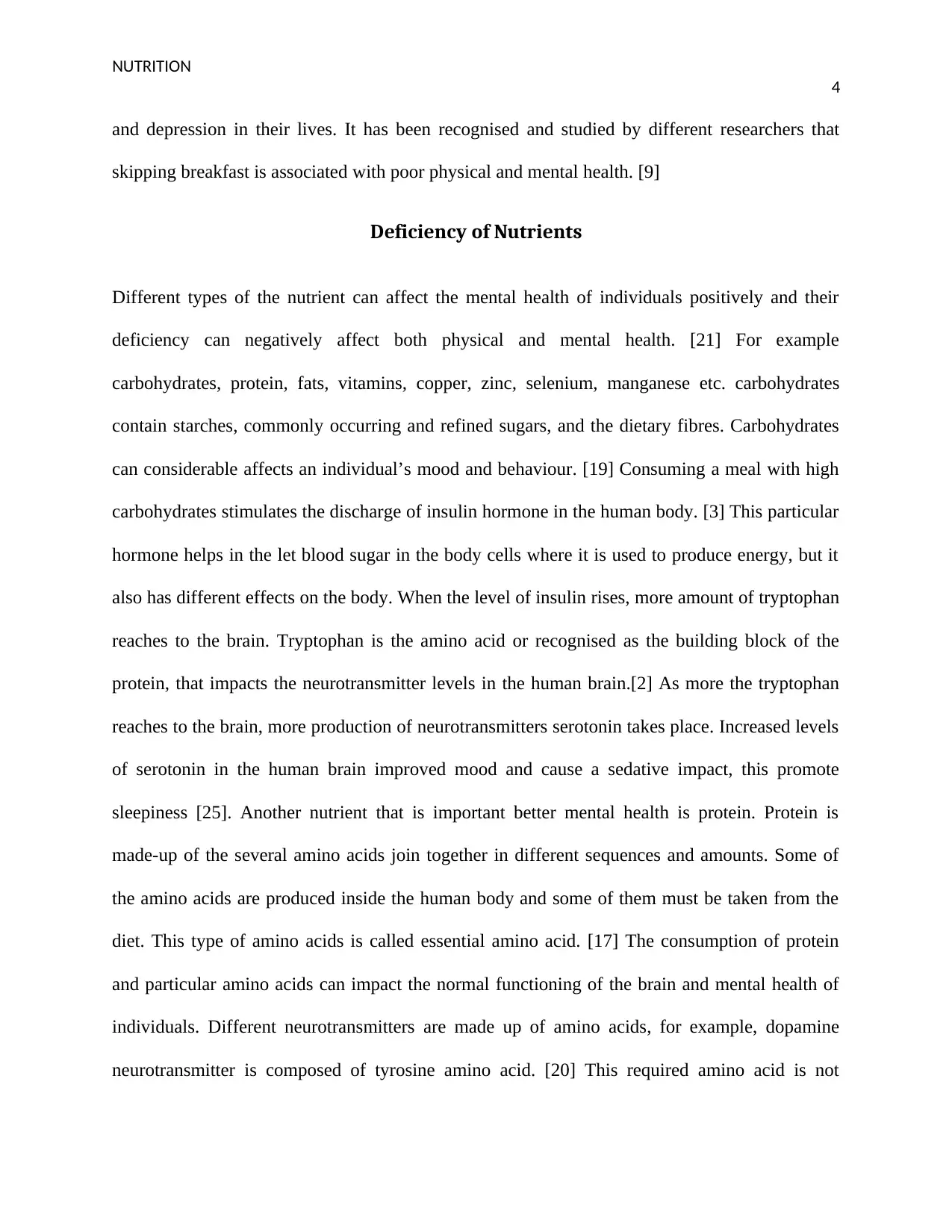
NUTRITION
4
and depression in their lives. It has been recognised and studied by different researchers that
skipping breakfast is associated with poor physical and mental health. [9]
Deficiency of Nutrients
Different types of the nutrient can affect the mental health of individuals positively and their
deficiency can negatively affect both physical and mental health. [21] For example
carbohydrates, protein, fats, vitamins, copper, zinc, selenium, manganese etc. carbohydrates
contain starches, commonly occurring and refined sugars, and the dietary fibres. Carbohydrates
can considerable affects an individual’s mood and behaviour. [19] Consuming a meal with high
carbohydrates stimulates the discharge of insulin hormone in the human body. [3] This particular
hormone helps in the let blood sugar in the body cells where it is used to produce energy, but it
also has different effects on the body. When the level of insulin rises, more amount of tryptophan
reaches to the brain. Tryptophan is the amino acid or recognised as the building block of the
protein, that impacts the neurotransmitter levels in the human brain.[2] As more the tryptophan
reaches to the brain, more production of neurotransmitters serotonin takes place. Increased levels
of serotonin in the human brain improved mood and cause a sedative impact, this promote
sleepiness [25]. Another nutrient that is important better mental health is protein. Protein is
made-up of the several amino acids join together in different sequences and amounts. Some of
the amino acids are produced inside the human body and some of them must be taken from the
diet. This type of amino acids is called essential amino acid. [17] The consumption of protein
and particular amino acids can impact the normal functioning of the brain and mental health of
individuals. Different neurotransmitters are made up of amino acids, for example, dopamine
neurotransmitter is composed of tyrosine amino acid. [20] This required amino acid is not
4
and depression in their lives. It has been recognised and studied by different researchers that
skipping breakfast is associated with poor physical and mental health. [9]
Deficiency of Nutrients
Different types of the nutrient can affect the mental health of individuals positively and their
deficiency can negatively affect both physical and mental health. [21] For example
carbohydrates, protein, fats, vitamins, copper, zinc, selenium, manganese etc. carbohydrates
contain starches, commonly occurring and refined sugars, and the dietary fibres. Carbohydrates
can considerable affects an individual’s mood and behaviour. [19] Consuming a meal with high
carbohydrates stimulates the discharge of insulin hormone in the human body. [3] This particular
hormone helps in the let blood sugar in the body cells where it is used to produce energy, but it
also has different effects on the body. When the level of insulin rises, more amount of tryptophan
reaches to the brain. Tryptophan is the amino acid or recognised as the building block of the
protein, that impacts the neurotransmitter levels in the human brain.[2] As more the tryptophan
reaches to the brain, more production of neurotransmitters serotonin takes place. Increased levels
of serotonin in the human brain improved mood and cause a sedative impact, this promote
sleepiness [25]. Another nutrient that is important better mental health is protein. Protein is
made-up of the several amino acids join together in different sequences and amounts. Some of
the amino acids are produced inside the human body and some of them must be taken from the
diet. This type of amino acids is called essential amino acid. [17] The consumption of protein
and particular amino acids can impact the normal functioning of the brain and mental health of
individuals. Different neurotransmitters are made up of amino acids, for example, dopamine
neurotransmitter is composed of tyrosine amino acid. [20] This required amino acid is not
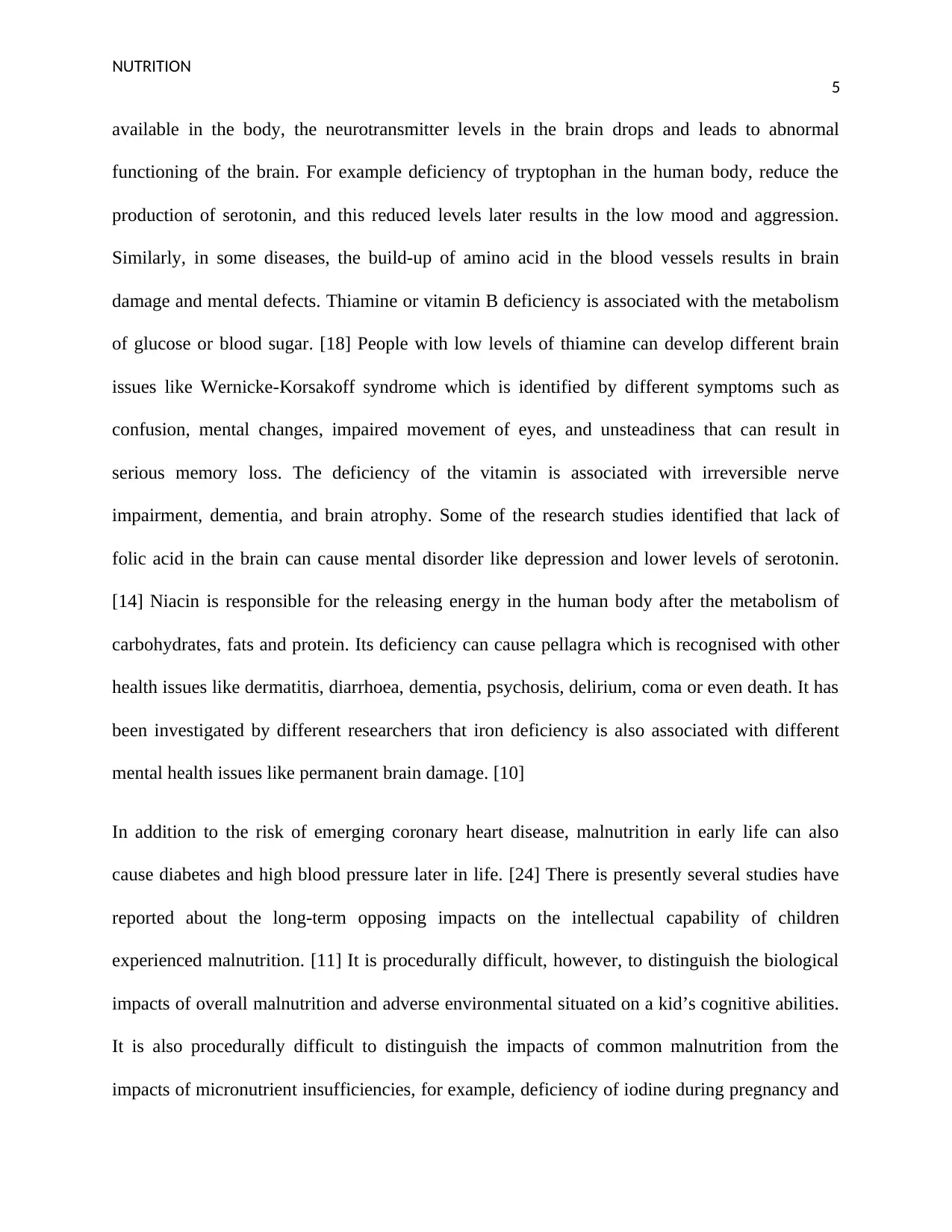
NUTRITION
5
available in the body, the neurotransmitter levels in the brain drops and leads to abnormal
functioning of the brain. For example deficiency of tryptophan in the human body, reduce the
production of serotonin, and this reduced levels later results in the low mood and aggression.
Similarly, in some diseases, the build-up of amino acid in the blood vessels results in brain
damage and mental defects. Thiamine or vitamin B deficiency is associated with the metabolism
of glucose or blood sugar. [18] People with low levels of thiamine can develop different brain
issues like Wernicke-Korsakoff syndrome which is identified by different symptoms such as
confusion, mental changes, impaired movement of eyes, and unsteadiness that can result in
serious memory loss. The deficiency of the vitamin is associated with irreversible nerve
impairment, dementia, and brain atrophy. Some of the research studies identified that lack of
folic acid in the brain can cause mental disorder like depression and lower levels of serotonin.
[14] Niacin is responsible for the releasing energy in the human body after the metabolism of
carbohydrates, fats and protein. Its deficiency can cause pellagra which is recognised with other
health issues like dermatitis, diarrhoea, dementia, psychosis, delirium, coma or even death. It has
been investigated by different researchers that iron deficiency is also associated with different
mental health issues like permanent brain damage. [10]
In addition to the risk of emerging coronary heart disease, malnutrition in early life can also
cause diabetes and high blood pressure later in life. [24] There is presently several studies have
reported about the long-term opposing impacts on the intellectual capability of children
experienced malnutrition. [11] It is procedurally difficult, however, to distinguish the biological
impacts of overall malnutrition and adverse environmental situated on a kid’s cognitive abilities.
It is also procedurally difficult to distinguish the impacts of common malnutrition from the
impacts of micronutrient insufficiencies, for example, deficiency of iodine during pregnancy and
5
available in the body, the neurotransmitter levels in the brain drops and leads to abnormal
functioning of the brain. For example deficiency of tryptophan in the human body, reduce the
production of serotonin, and this reduced levels later results in the low mood and aggression.
Similarly, in some diseases, the build-up of amino acid in the blood vessels results in brain
damage and mental defects. Thiamine or vitamin B deficiency is associated with the metabolism
of glucose or blood sugar. [18] People with low levels of thiamine can develop different brain
issues like Wernicke-Korsakoff syndrome which is identified by different symptoms such as
confusion, mental changes, impaired movement of eyes, and unsteadiness that can result in
serious memory loss. The deficiency of the vitamin is associated with irreversible nerve
impairment, dementia, and brain atrophy. Some of the research studies identified that lack of
folic acid in the brain can cause mental disorder like depression and lower levels of serotonin.
[14] Niacin is responsible for the releasing energy in the human body after the metabolism of
carbohydrates, fats and protein. Its deficiency can cause pellagra which is recognised with other
health issues like dermatitis, diarrhoea, dementia, psychosis, delirium, coma or even death. It has
been investigated by different researchers that iron deficiency is also associated with different
mental health issues like permanent brain damage. [10]
In addition to the risk of emerging coronary heart disease, malnutrition in early life can also
cause diabetes and high blood pressure later in life. [24] There is presently several studies have
reported about the long-term opposing impacts on the intellectual capability of children
experienced malnutrition. [11] It is procedurally difficult, however, to distinguish the biological
impacts of overall malnutrition and adverse environmental situated on a kid’s cognitive abilities.
It is also procedurally difficult to distinguish the impacts of common malnutrition from the
impacts of micronutrient insufficiencies, for example, deficiency of iodine during pregnancy and
⊘ This is a preview!⊘
Do you want full access?
Subscribe today to unlock all pages.

Trusted by 1+ million students worldwide
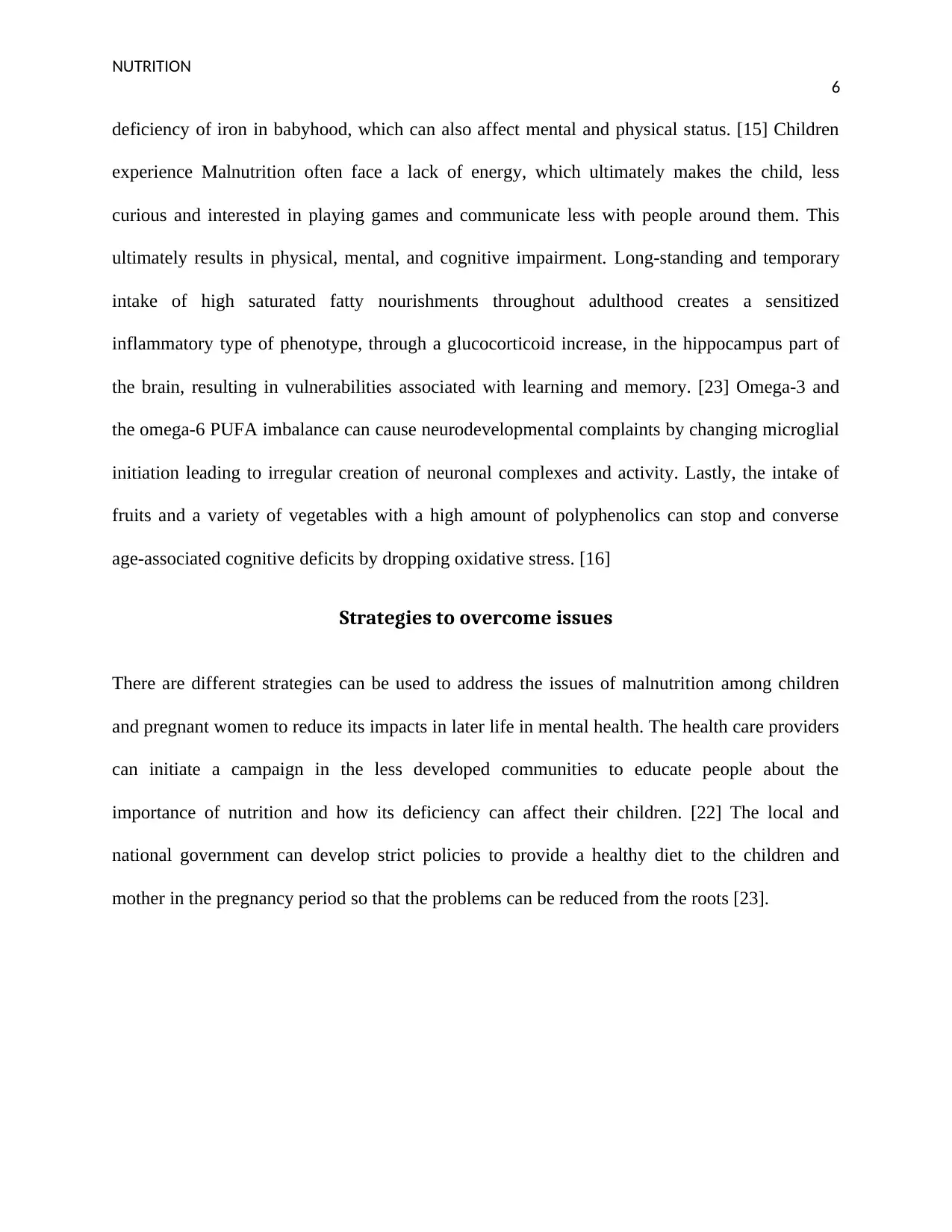
NUTRITION
6
deficiency of iron in babyhood, which can also affect mental and physical status. [15] Children
experience Malnutrition often face a lack of energy, which ultimately makes the child, less
curious and interested in playing games and communicate less with people around them. This
ultimately results in physical, mental, and cognitive impairment. Long-standing and temporary
intake of high saturated fatty nourishments throughout adulthood creates a sensitized
inflammatory type of phenotype, through a glucocorticoid increase, in the hippocampus part of
the brain, resulting in vulnerabilities associated with learning and memory. [23] Omega-3 and
the omega-6 PUFA imbalance can cause neurodevelopmental complaints by changing microglial
initiation leading to irregular creation of neuronal complexes and activity. Lastly, the intake of
fruits and a variety of vegetables with a high amount of polyphenolics can stop and converse
age-associated cognitive deficits by dropping oxidative stress. [16]
Strategies to overcome issues
There are different strategies can be used to address the issues of malnutrition among children
and pregnant women to reduce its impacts in later life in mental health. The health care providers
can initiate a campaign in the less developed communities to educate people about the
importance of nutrition and how its deficiency can affect their children. [22] The local and
national government can develop strict policies to provide a healthy diet to the children and
mother in the pregnancy period so that the problems can be reduced from the roots [23].
6
deficiency of iron in babyhood, which can also affect mental and physical status. [15] Children
experience Malnutrition often face a lack of energy, which ultimately makes the child, less
curious and interested in playing games and communicate less with people around them. This
ultimately results in physical, mental, and cognitive impairment. Long-standing and temporary
intake of high saturated fatty nourishments throughout adulthood creates a sensitized
inflammatory type of phenotype, through a glucocorticoid increase, in the hippocampus part of
the brain, resulting in vulnerabilities associated with learning and memory. [23] Omega-3 and
the omega-6 PUFA imbalance can cause neurodevelopmental complaints by changing microglial
initiation leading to irregular creation of neuronal complexes and activity. Lastly, the intake of
fruits and a variety of vegetables with a high amount of polyphenolics can stop and converse
age-associated cognitive deficits by dropping oxidative stress. [16]
Strategies to overcome issues
There are different strategies can be used to address the issues of malnutrition among children
and pregnant women to reduce its impacts in later life in mental health. The health care providers
can initiate a campaign in the less developed communities to educate people about the
importance of nutrition and how its deficiency can affect their children. [22] The local and
national government can develop strict policies to provide a healthy diet to the children and
mother in the pregnancy period so that the problems can be reduced from the roots [23].
Paraphrase This Document
Need a fresh take? Get an instant paraphrase of this document with our AI Paraphraser
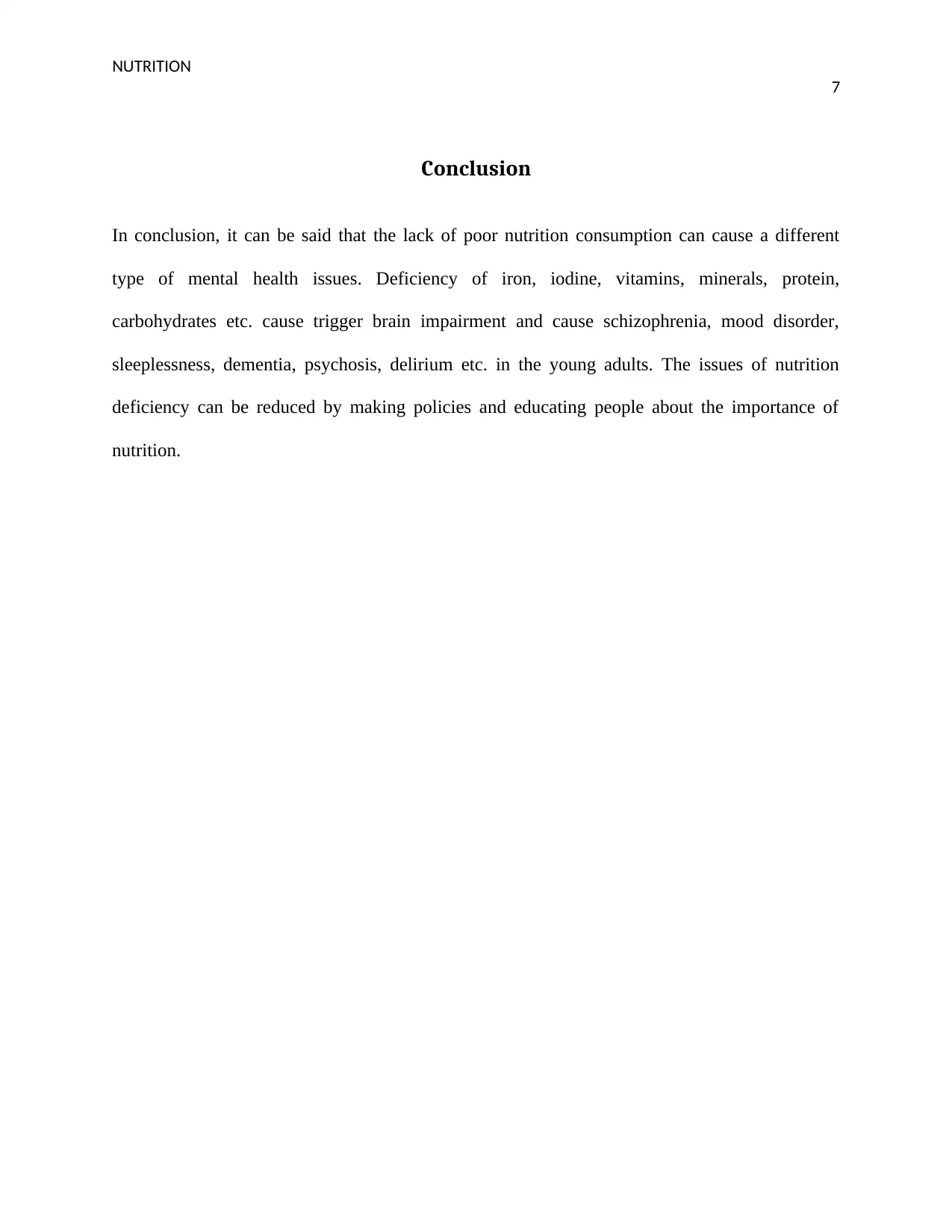
NUTRITION
7
Conclusion
In conclusion, it can be said that the lack of poor nutrition consumption can cause a different
type of mental health issues. Deficiency of iron, iodine, vitamins, minerals, protein,
carbohydrates etc. cause trigger brain impairment and cause schizophrenia, mood disorder,
sleeplessness, dementia, psychosis, delirium etc. in the young adults. The issues of nutrition
deficiency can be reduced by making policies and educating people about the importance of
nutrition.
7
Conclusion
In conclusion, it can be said that the lack of poor nutrition consumption can cause a different
type of mental health issues. Deficiency of iron, iodine, vitamins, minerals, protein,
carbohydrates etc. cause trigger brain impairment and cause schizophrenia, mood disorder,
sleeplessness, dementia, psychosis, delirium etc. in the young adults. The issues of nutrition
deficiency can be reduced by making policies and educating people about the importance of
nutrition.
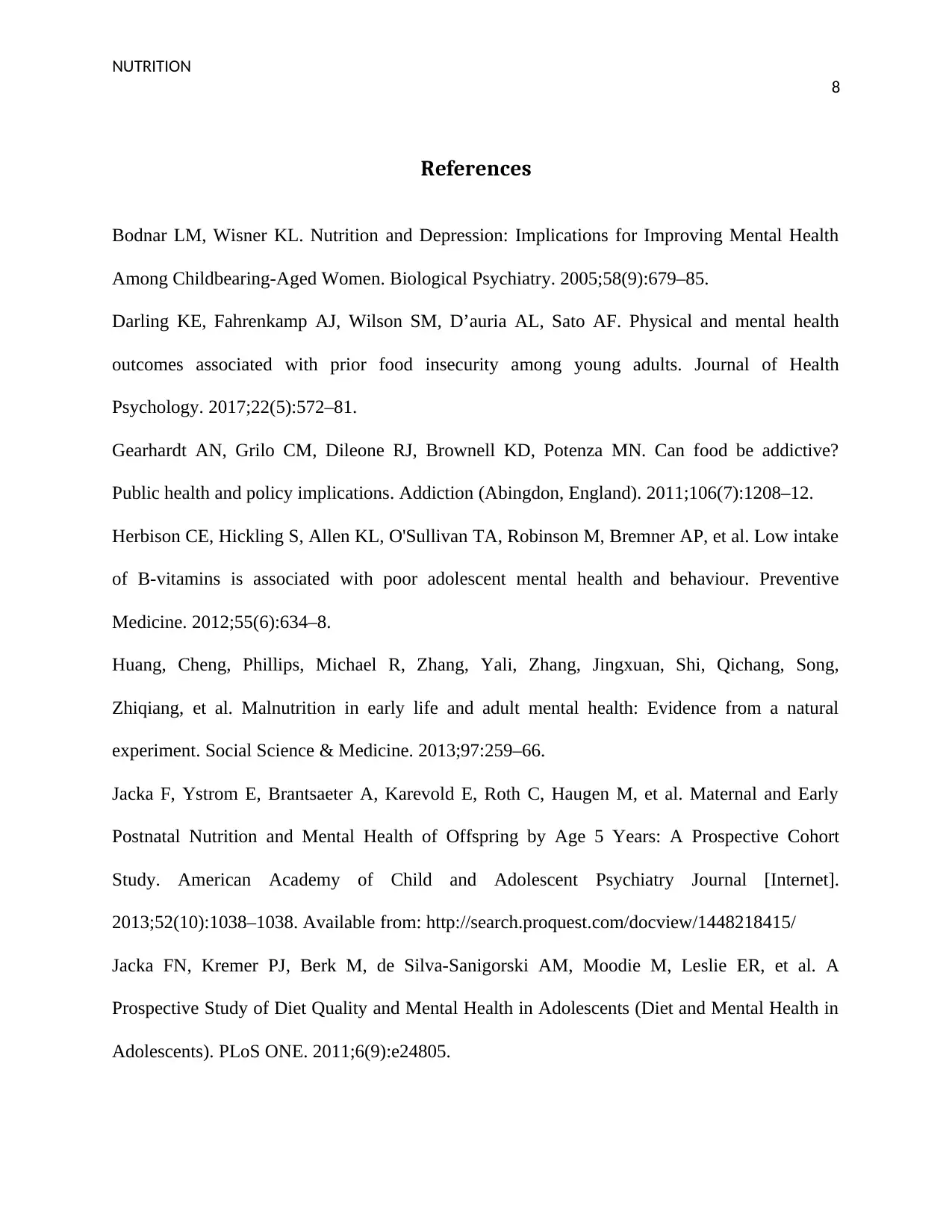
NUTRITION
8
References
Bodnar LM, Wisner KL. Nutrition and Depression: Implications for Improving Mental Health
Among Childbearing-Aged Women. Biological Psychiatry. 2005;58(9):679–85.
Darling KE, Fahrenkamp AJ, Wilson SM, D’auria AL, Sato AF. Physical and mental health
outcomes associated with prior food insecurity among young adults. Journal of Health
Psychology. 2017;22(5):572–81.
Gearhardt AN, Grilo CM, Dileone RJ, Brownell KD, Potenza MN. Can food be addictive?
Public health and policy implications. Addiction (Abingdon, England). 2011;106(7):1208–12.
Herbison CE, Hickling S, Allen KL, O'Sullivan TA, Robinson M, Bremner AP, et al. Low intake
of B-vitamins is associated with poor adolescent mental health and behaviour. Preventive
Medicine. 2012;55(6):634–8.
Huang, Cheng, Phillips, Michael R, Zhang, Yali, Zhang, Jingxuan, Shi, Qichang, Song,
Zhiqiang, et al. Malnutrition in early life and adult mental health: Evidence from a natural
experiment. Social Science & Medicine. 2013;97:259–66.
Jacka F, Ystrom E, Brantsaeter A, Karevold E, Roth C, Haugen M, et al. Maternal and Early
Postnatal Nutrition and Mental Health of Offspring by Age 5 Years: A Prospective Cohort
Study. American Academy of Child and Adolescent Psychiatry Journal [Internet].
2013;52(10):1038–1038. Available from: http://search.proquest.com/docview/1448218415/
Jacka FN, Kremer PJ, Berk M, de Silva-Sanigorski AM, Moodie M, Leslie ER, et al. A
Prospective Study of Diet Quality and Mental Health in Adolescents (Diet and Mental Health in
Adolescents). PLoS ONE. 2011;6(9):e24805.
8
References
Bodnar LM, Wisner KL. Nutrition and Depression: Implications for Improving Mental Health
Among Childbearing-Aged Women. Biological Psychiatry. 2005;58(9):679–85.
Darling KE, Fahrenkamp AJ, Wilson SM, D’auria AL, Sato AF. Physical and mental health
outcomes associated with prior food insecurity among young adults. Journal of Health
Psychology. 2017;22(5):572–81.
Gearhardt AN, Grilo CM, Dileone RJ, Brownell KD, Potenza MN. Can food be addictive?
Public health and policy implications. Addiction (Abingdon, England). 2011;106(7):1208–12.
Herbison CE, Hickling S, Allen KL, O'Sullivan TA, Robinson M, Bremner AP, et al. Low intake
of B-vitamins is associated with poor adolescent mental health and behaviour. Preventive
Medicine. 2012;55(6):634–8.
Huang, Cheng, Phillips, Michael R, Zhang, Yali, Zhang, Jingxuan, Shi, Qichang, Song,
Zhiqiang, et al. Malnutrition in early life and adult mental health: Evidence from a natural
experiment. Social Science & Medicine. 2013;97:259–66.
Jacka F, Ystrom E, Brantsaeter A, Karevold E, Roth C, Haugen M, et al. Maternal and Early
Postnatal Nutrition and Mental Health of Offspring by Age 5 Years: A Prospective Cohort
Study. American Academy of Child and Adolescent Psychiatry Journal [Internet].
2013;52(10):1038–1038. Available from: http://search.proquest.com/docview/1448218415/
Jacka FN, Kremer PJ, Berk M, de Silva-Sanigorski AM, Moodie M, Leslie ER, et al. A
Prospective Study of Diet Quality and Mental Health in Adolescents (Diet and Mental Health in
Adolescents). PLoS ONE. 2011;6(9):e24805.
⊘ This is a preview!⊘
Do you want full access?
Subscribe today to unlock all pages.

Trusted by 1+ million students worldwide
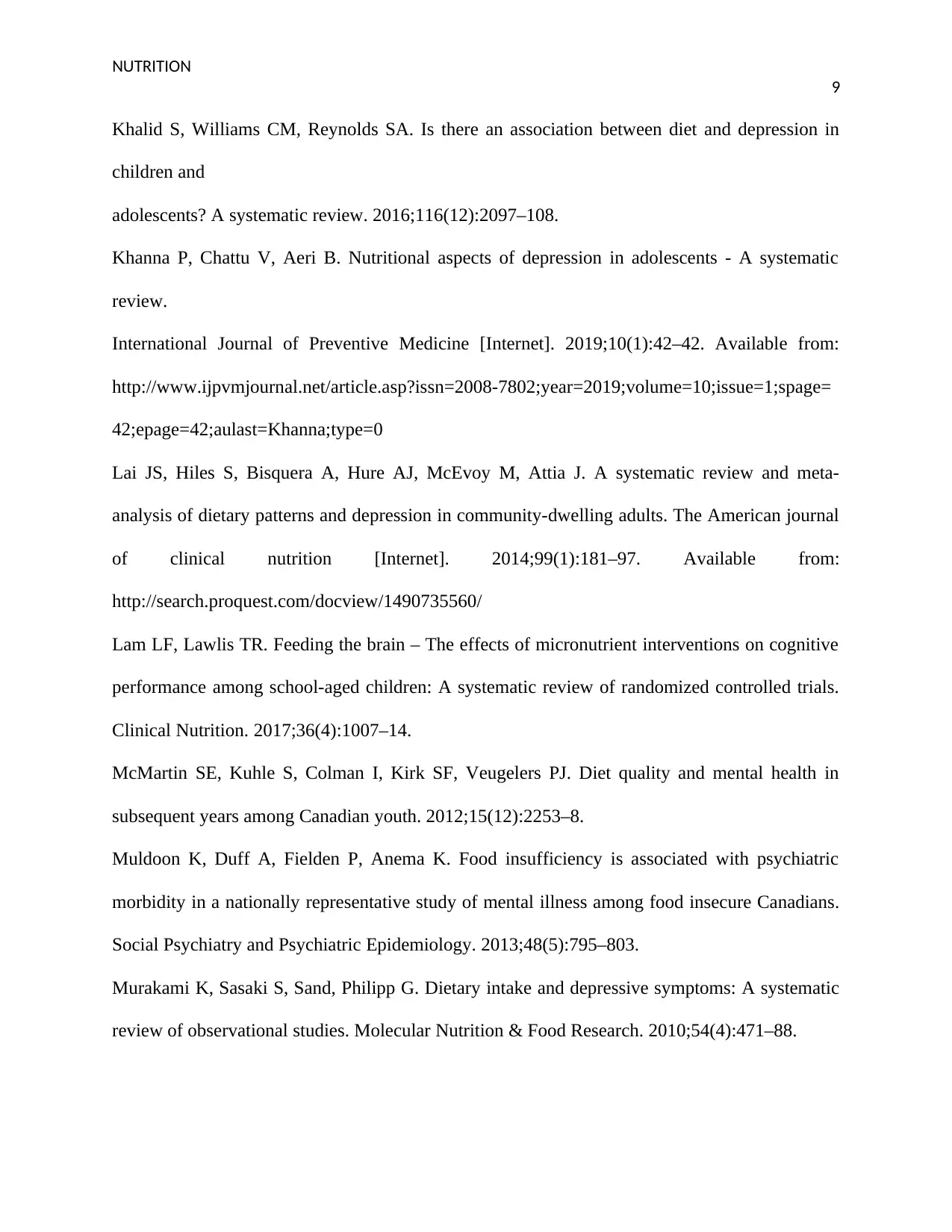
NUTRITION
9
Khalid S, Williams CM, Reynolds SA. Is there an association between diet and depression in
children and
adolescents? A systematic review. 2016;116(12):2097–108.
Khanna P, Chattu V, Aeri B. Nutritional aspects of depression in adolescents - A systematic
review.
International Journal of Preventive Medicine [Internet]. 2019;10(1):42–42. Available from:
http://www.ijpvmjournal.net/article.asp?issn=2008-7802;year=2019;volume=10;issue=1;spage=
42;epage=42;aulast=Khanna;type=0
Lai JS, Hiles S, Bisquera A, Hure AJ, McEvoy M, Attia J. A systematic review and meta-
analysis of dietary patterns and depression in community-dwelling adults. The American journal
of clinical nutrition [Internet]. 2014;99(1):181–97. Available from:
http://search.proquest.com/docview/1490735560/
Lam LF, Lawlis TR. Feeding the brain – The effects of micronutrient interventions on cognitive
performance among school-aged children: A systematic review of randomized controlled trials.
Clinical Nutrition. 2017;36(4):1007–14.
McMartin SE, Kuhle S, Colman I, Kirk SF, Veugelers PJ. Diet quality and mental health in
subsequent years among Canadian youth. 2012;15(12):2253–8.
Muldoon K, Duff A, Fielden P, Anema K. Food insufficiency is associated with psychiatric
morbidity in a nationally representative study of mental illness among food insecure Canadians.
Social Psychiatry and Psychiatric Epidemiology. 2013;48(5):795–803.
Murakami K, Sasaki S, Sand, Philipp G. Dietary intake and depressive symptoms: A systematic
review of observational studies. Molecular Nutrition & Food Research. 2010;54(4):471–88.
9
Khalid S, Williams CM, Reynolds SA. Is there an association between diet and depression in
children and
adolescents? A systematic review. 2016;116(12):2097–108.
Khanna P, Chattu V, Aeri B. Nutritional aspects of depression in adolescents - A systematic
review.
International Journal of Preventive Medicine [Internet]. 2019;10(1):42–42. Available from:
http://www.ijpvmjournal.net/article.asp?issn=2008-7802;year=2019;volume=10;issue=1;spage=
42;epage=42;aulast=Khanna;type=0
Lai JS, Hiles S, Bisquera A, Hure AJ, McEvoy M, Attia J. A systematic review and meta-
analysis of dietary patterns and depression in community-dwelling adults. The American journal
of clinical nutrition [Internet]. 2014;99(1):181–97. Available from:
http://search.proquest.com/docview/1490735560/
Lam LF, Lawlis TR. Feeding the brain – The effects of micronutrient interventions on cognitive
performance among school-aged children: A systematic review of randomized controlled trials.
Clinical Nutrition. 2017;36(4):1007–14.
McMartin SE, Kuhle S, Colman I, Kirk SF, Veugelers PJ. Diet quality and mental health in
subsequent years among Canadian youth. 2012;15(12):2253–8.
Muldoon K, Duff A, Fielden P, Anema K. Food insufficiency is associated with psychiatric
morbidity in a nationally representative study of mental illness among food insecure Canadians.
Social Psychiatry and Psychiatric Epidemiology. 2013;48(5):795–803.
Murakami K, Sasaki S, Sand, Philipp G. Dietary intake and depressive symptoms: A systematic
review of observational studies. Molecular Nutrition & Food Research. 2010;54(4):471–88.
Paraphrase This Document
Need a fresh take? Get an instant paraphrase of this document with our AI Paraphraser
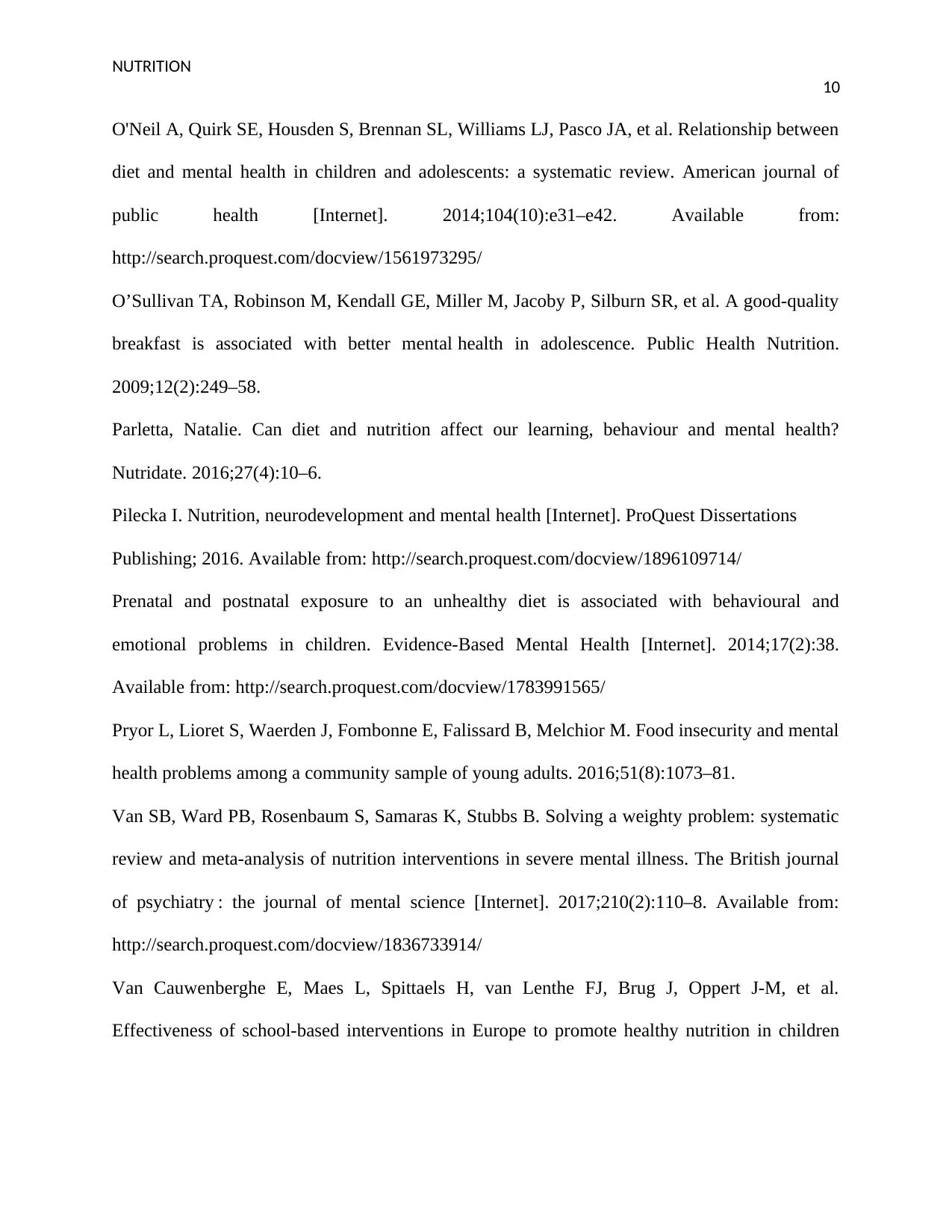
NUTRITION
10
O'Neil A, Quirk SE, Housden S, Brennan SL, Williams LJ, Pasco JA, et al. Relationship between
diet and mental health in children and adolescents: a systematic review. American journal of
public health [Internet]. 2014;104(10):e31–e42. Available from:
http://search.proquest.com/docview/1561973295/
O’Sullivan TA, Robinson M, Kendall GE, Miller M, Jacoby P, Silburn SR, et al. A good-quality
breakfast is associated with better mental health in adolescence. Public Health Nutrition.
2009;12(2):249–58.
Parletta, Natalie. Can diet and nutrition affect our learning, behaviour and mental health?
Nutridate. 2016;27(4):10–6.
Pilecka I. Nutrition, neurodevelopment and mental health [Internet]. ProQuest Dissertations
Publishing; 2016. Available from: http://search.proquest.com/docview/1896109714/
Prenatal and postnatal exposure to an unhealthy diet is associated with behavioural and
emotional problems in children. Evidence-Based Mental Health [Internet]. 2014;17(2):38.
Available from: http://search.proquest.com/docview/1783991565/
Pryor L, Lioret S, Waerden J, Fombonne E, Falissard B, Melchior M. Food insecurity and mental
health problems among a community sample of young adults. 2016;51(8):1073–81.
Van SB, Ward PB, Rosenbaum S, Samaras K, Stubbs B. Solving a weighty problem: systematic
review and meta-analysis of nutrition interventions in severe mental illness. The British journal
of psychiatry : the journal of mental science [Internet]. 2017;210(2):110–8. Available from:
http://search.proquest.com/docview/1836733914/
Van Cauwenberghe E, Maes L, Spittaels H, van Lenthe FJ, Brug J, Oppert J-M, et al.
Effectiveness of school-based interventions in Europe to promote healthy nutrition in children
10
O'Neil A, Quirk SE, Housden S, Brennan SL, Williams LJ, Pasco JA, et al. Relationship between
diet and mental health in children and adolescents: a systematic review. American journal of
public health [Internet]. 2014;104(10):e31–e42. Available from:
http://search.proquest.com/docview/1561973295/
O’Sullivan TA, Robinson M, Kendall GE, Miller M, Jacoby P, Silburn SR, et al. A good-quality
breakfast is associated with better mental health in adolescence. Public Health Nutrition.
2009;12(2):249–58.
Parletta, Natalie. Can diet and nutrition affect our learning, behaviour and mental health?
Nutridate. 2016;27(4):10–6.
Pilecka I. Nutrition, neurodevelopment and mental health [Internet]. ProQuest Dissertations
Publishing; 2016. Available from: http://search.proquest.com/docview/1896109714/
Prenatal and postnatal exposure to an unhealthy diet is associated with behavioural and
emotional problems in children. Evidence-Based Mental Health [Internet]. 2014;17(2):38.
Available from: http://search.proquest.com/docview/1783991565/
Pryor L, Lioret S, Waerden J, Fombonne E, Falissard B, Melchior M. Food insecurity and mental
health problems among a community sample of young adults. 2016;51(8):1073–81.
Van SB, Ward PB, Rosenbaum S, Samaras K, Stubbs B. Solving a weighty problem: systematic
review and meta-analysis of nutrition interventions in severe mental illness. The British journal
of psychiatry : the journal of mental science [Internet]. 2017;210(2):110–8. Available from:
http://search.proquest.com/docview/1836733914/
Van Cauwenberghe E, Maes L, Spittaels H, van Lenthe FJ, Brug J, Oppert J-M, et al.
Effectiveness of school-based interventions in Europe to promote healthy nutrition in children
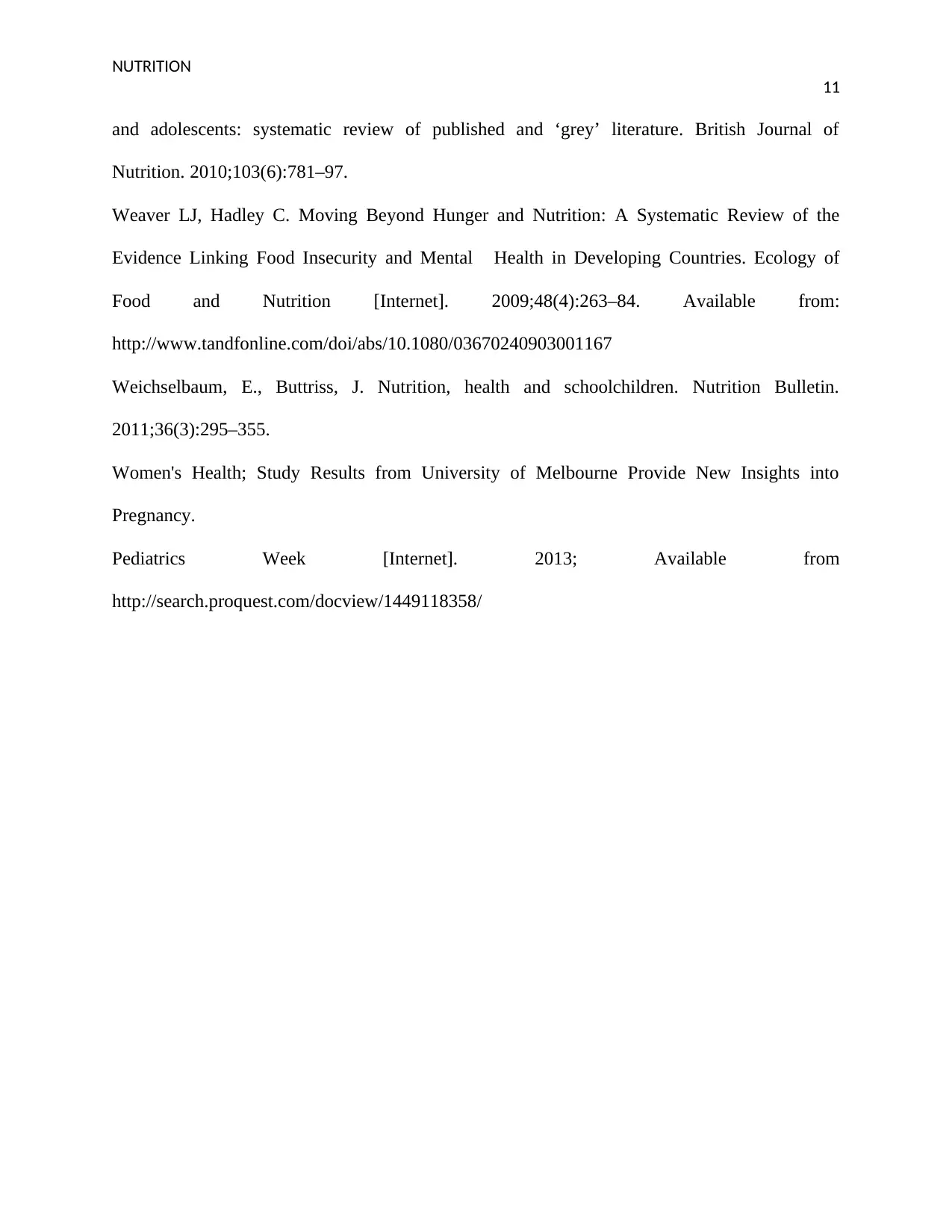
NUTRITION
11
and adolescents: systematic review of published and ‘grey’ literature. British Journal of
Nutrition. 2010;103(6):781–97.
Weaver LJ, Hadley C. Moving Beyond Hunger and Nutrition: A Systematic Review of the
Evidence Linking Food Insecurity and Mental Health in Developing Countries. Ecology of
Food and Nutrition [Internet]. 2009;48(4):263–84. Available from:
http://www.tandfonline.com/doi/abs/10.1080/03670240903001167
Weichselbaum, E., Buttriss, J. Nutrition, health and schoolchildren. Nutrition Bulletin.
2011;36(3):295–355.
Women's Health; Study Results from University of Melbourne Provide New Insights into
Pregnancy.
Pediatrics Week [Internet]. 2013; Available from
http://search.proquest.com/docview/1449118358/
11
and adolescents: systematic review of published and ‘grey’ literature. British Journal of
Nutrition. 2010;103(6):781–97.
Weaver LJ, Hadley C. Moving Beyond Hunger and Nutrition: A Systematic Review of the
Evidence Linking Food Insecurity and Mental Health in Developing Countries. Ecology of
Food and Nutrition [Internet]. 2009;48(4):263–84. Available from:
http://www.tandfonline.com/doi/abs/10.1080/03670240903001167
Weichselbaum, E., Buttriss, J. Nutrition, health and schoolchildren. Nutrition Bulletin.
2011;36(3):295–355.
Women's Health; Study Results from University of Melbourne Provide New Insights into
Pregnancy.
Pediatrics Week [Internet]. 2013; Available from
http://search.proquest.com/docview/1449118358/
⊘ This is a preview!⊘
Do you want full access?
Subscribe today to unlock all pages.

Trusted by 1+ million students worldwide
1 out of 12
Related Documents
Your All-in-One AI-Powered Toolkit for Academic Success.
+13062052269
info@desklib.com
Available 24*7 on WhatsApp / Email
![[object Object]](/_next/static/media/star-bottom.7253800d.svg)
Unlock your academic potential
Copyright © 2020–2026 A2Z Services. All Rights Reserved. Developed and managed by ZUCOL.





